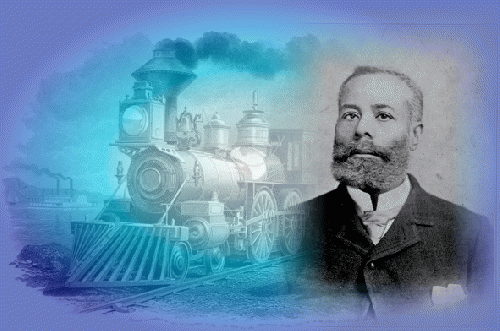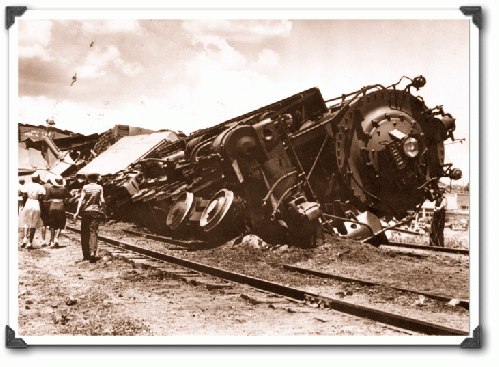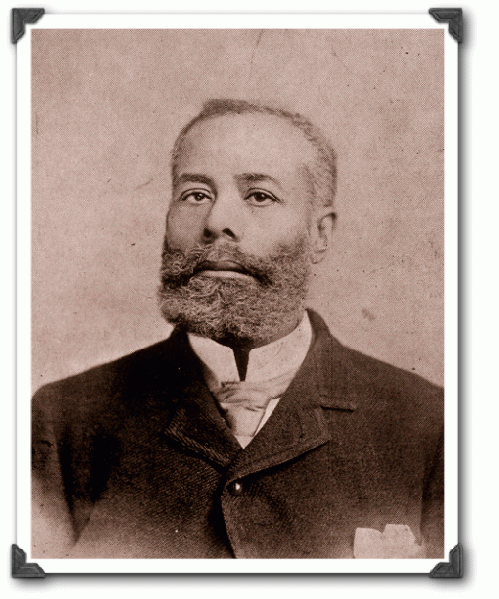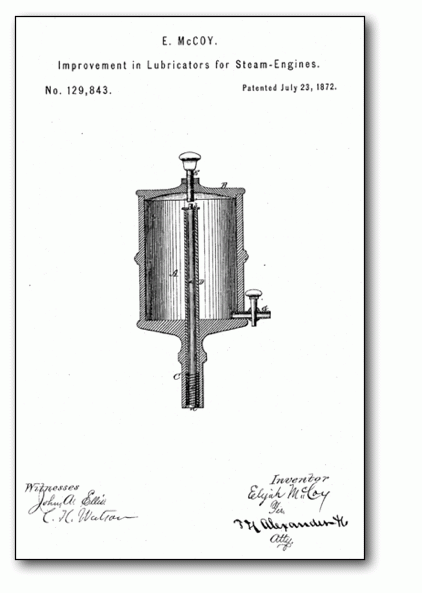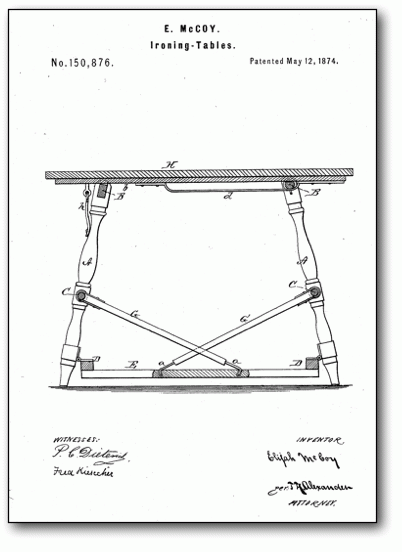Elijah McCoy was a black American inventor whose committment to quality, excellence and integrity gave rise, in the late 1800s, to the term, the Real McCoy. His remarkable path took him from Canada to Scotland to the U.S., directly into prejudice and out the other side.
Elijah was one of a dozen children of George and Mildred McCoy, slaves who escaped via the Underground Railroad from Kentucky to Canada. They settled just across the border, not far from Detroit. Elijah's father fought in the Canadian 1837 Rebel War, and was given 160 acres of farmland in Ontario as payment. Elijah was born there in 1844. At a time when it was illegal in the U.S. for slaves to learn to read or write, the McCoys were able to see their children well educated in public school.
Elijah's unusual interest and aptitude in machines and mechanics led his parents to send him to Edinburgh, Scotland, at age 16 to learn mechanical engineering. By the time he completed his training, the Civil War was over. U.S. slaves had been technically freed by the Emancipation Proclamation, and the McCoy family moved back across the border, to the Detroit area.
The Transcontinental Railroad had been started in 1863, and would be completed with the Golden Spike in 1869. The relative ease and affordability with which people and goods began to be transported across the U.S. ushered in a new world.
Steam was king, and the railroads changed almost every aspect of American life, including the perception of time. Time zones were not standard then. But it became apparent that it would be useful to know exactly when trains--running in opposite directions--would be using the same track, so standardized time zones were established.
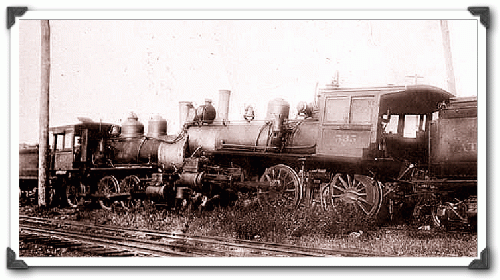
Head on collision of steam locomotives near Sanford, Florida, c 1898.
(Image by Public domain) Details DMCA
George Washington couldn't get across the land any faster than Julius Caesar--but Abraham Lincoln could, and what made that possible is the steam locomotive. The steam locomotive allowed people and goods to be moved for great distances at high speeds. It changed transit time from New York to California from six months to six days, thereby bringing us together as a nation...(the locomotive is) the machine that changed America. - H. P. Claussen
When Elijah returned from Scotland he settled near Detroit, in Ipsilanti. However, because of his color, he was unable to get a job in an engineering position, which was considered "white man's work." He finally had to accept a physically demanding and dangerous job as a fireman and oilman for the Michigan Central Railroad. But there was light at the end of the tunnel.
A railroad fireman typically shoveled two tons of coal into the locomotive's ravenous firebox every hour, and there was no time to rest--if the fire burned out, the train stopped.
It was also part of McCoy's job to monitor the level of water in the boiler. If the water level got too low, pressure would build up and could cause an explosion.
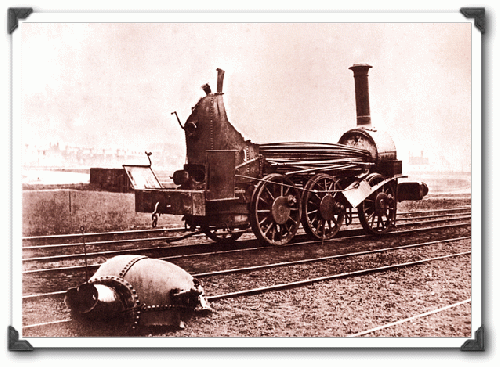
Remains of a steam locomotive after a boiler explosion
(Image by (From Wikimedia) Unknown author, Author: Unknown author) Details Source DMCA
And since the friction of steel rubbing against steel at high speeds was so enormous, the train had to be stopped regularly for lubrication of a multitude of moving parts, including not only the engine parts, but the axles, wheels, and bearings of every car. Stopping the train frequently for maintenance was inefficient and expensive. But if lubrications were not performed in time or completely, the results could include fire or derailment from worn mechanical parts.
Lubricating the whole train was a time consuming and dangerous job for one man with a handheld oil can. A fireman/oilman like McCoy had to traverse the length of the stopped train to oil all the scorching hot moving parts, some of which were difficult to reach.
Fire from friction was so frequent that the iconic cupola of the caboose was specifically designed as a surveillance post from which to identify smoke or other problems from overheating. A fire could quickly destroy an entire railroad car along with the other cars coupled to it, so someone had to be on constant lookout.
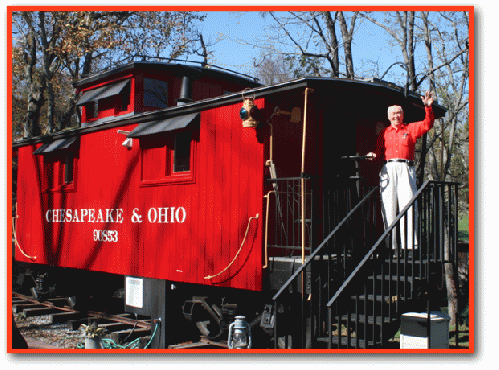
The author's father waving from the 1926 C&O Caboose vacation rental in Natural Bridge, VA
(Image by Photo by Meryl Ann Butler of the 1926 C&O Caboose vacation rental) Details DMCA
Some of these steam locomotives are huge monsters--as a comparison, 4014, a Union Pacific Big Boy Locomotive, (admiittedly one of the world's largest steam locomotives) is 132 feet long--that's 12 feet longer than the Wright brother's first flight!
So, it is not a good idea to let these behemoths burn, explode or fall over. Therefore anything that could help keep them running more smoothly meant greater safety, profitability and progress.
Elijah was right on track to do something about this, perhaps the only man in the world in this singular position. He was a genius mechanical engineer with a penchant for invention, uniquely coupled with the physically exhausting job of railroad fireman. A white man with international training in engineering would have never found himself working as a railroad fireman, and it took understanding both sides of the lubrication issue in order to invent a more efficient method.
Inspired, McCoy began to develop an automatic lubricating cup that could be fitted into the steam cylinders of a locomotive, making the job of oiling the train safer and more efficient. After a couple of years of experimentation, McCoy patented his first version in 1872. His patent application says that his device provided "a continuous flow of oil on the gears and other moving parts of a machine."
Elijah McCoy's invention "speeded up the railroads, and faster railroad deliveries spurred the economic growth of a nation." - Aaron E. Klein, The Hidden Contributors: Black Scientists and Inventors in America
The Michigan Central Railroad saw that McCoy's lubrication device was better than any of the others, and they installed his automatic oil cup on their trains. Word got out that McCoy's invention was the superior solution to the problem. But after initial interest in McCoy's celebrated oil cup, some of the prospective buyers suddenly ignored the product when they found out that the inventor was black.
Of course, McCoy was not the only black inventor who faced prejudice. In 1914 Garrett Morgan patented the earliest version of the gas mask, a smoke protection hood which he designed for firemen. Even though the contraption had already been proven to save lives, some fire departments cancelled their purchase orders after they found out the inventor was black. To dodge the effects of prejudice--thereby providing safety for many of the people who denigrated him--Morgan hired a white actor to impersonate him in order to make sales.
Other inventors tried and failed to make a product as effective as McCoy's oil cup. But the railroad engineers knew which product was the safest and most efficient--and they knew that their lives might depend on it. It's said that they would often enquire whether a locomotive was fitted with "the Real McCoy."
Most of the men who insisted on the 'Real McCoy' may indeed have been factory owners or railroad owners who discriminated against blacks in employment, and who never knew that the perfection they sought was the product of the genius of a black man.
-Aaron E. Klein, The Hidden Contributors: Black Scientists and Inventors in America
In the 1880's McCoy left the railroad to to serve as a mechanical consultant for several Detroit firms. He and his wife Mary moved into a newly integrated neighborhood where the mayor of Detroit also lived, and in addition to his job, McCoy mentored young people. Mary was active in the suffragette movement, and was the only black charter member of the Twentieth Century Club, a group of socially prominent, civic-minded women in the Detroit area.
In the early 1900's when a new type of locomotive called the superheater was being used, it required a different kind of lubricator, which McCoy developed. And in 1920 he founded the Elijah McCoy Manufacturing Company.
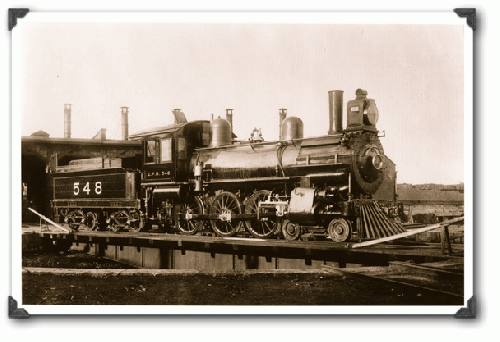
Ten-Wheeler 548 was the first superheated steam locomotive in the Western Hemisphere. Early 1900's.
(Image by Public domain) Details DMCA
Ultimately, McCoy held nearly 60 patents, most of which were related to machine lubrication. But he also invented the first lawn sprinkler, and in response to his wife Mary's needs, he invented the first folding ironing board. Some years he patented two or three new devices!
Versions of his original lubricating cup are still used in a variety of machines in factories, mining, construction equipment, ships, and in space exploration vehicles.
Forty-six years after he died, in 1975, Detroit named a street after him and placed an historic marker near the site of his home. He is one of few Michigan residents commemorated by two historical markers.
McCoy's life was defined by the railroad archetype from the time his parents used the Underground Railroad to escape to a place in which their children could thrive, to his reluctant acceptance of the only job he could find, as a railroad fireman, to his extraordinary inventions which improved the safety and efficiency of the railroad industry.
Coincidental twists of fate often have a way of balancing the scales, and perhaps the most satisfying anecdote honoring McCoy and others of his ilk may be the double-entendre of a tradition in the steam train world: when a railroad worker saw sparks or any light energy which might indicate combustion or destruction of the wheel bearings, he would shout "red" to alert other crew members, and begin to brake for an emergency stop.
But if after an inspection, all was well, the trainman would shout the good news to the other crew members: "All black!"
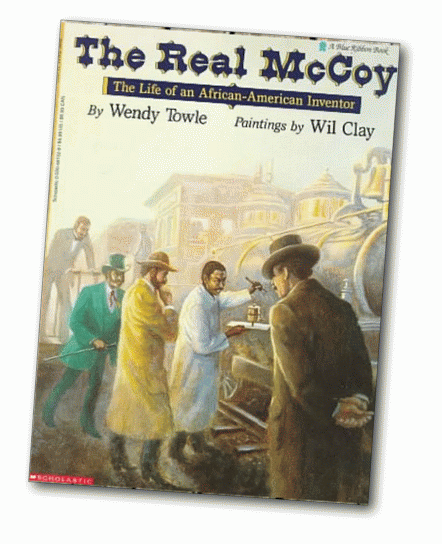
The Real McCoy: The Life of an African-American Inventor
(Image by by Wendy Towle, illustrations by Wil Clay) Details DMCA
RESOURCES:
A lovely picture book for kids or adults is "The Real McCoy: The Life of an African-American Inventor" by Wendy Towle, with beautiful illustrations by Wil Clay.
Author's note: There are different opinions regarding exactly what started the use of the phrase, "The Real McCoy," but there is no way to tell for sure, and Elijah McCoy's story certainly seems to be deserving.



